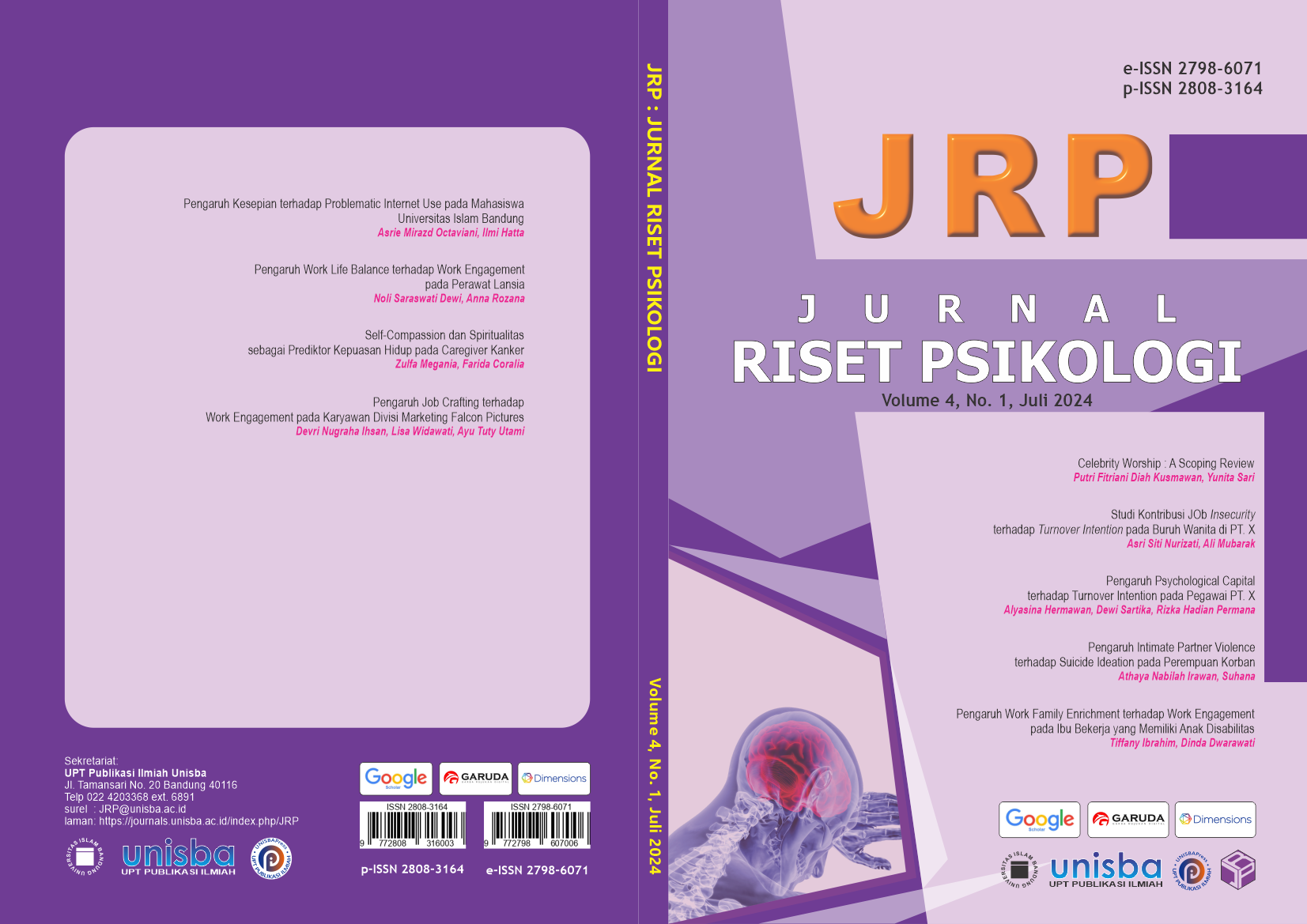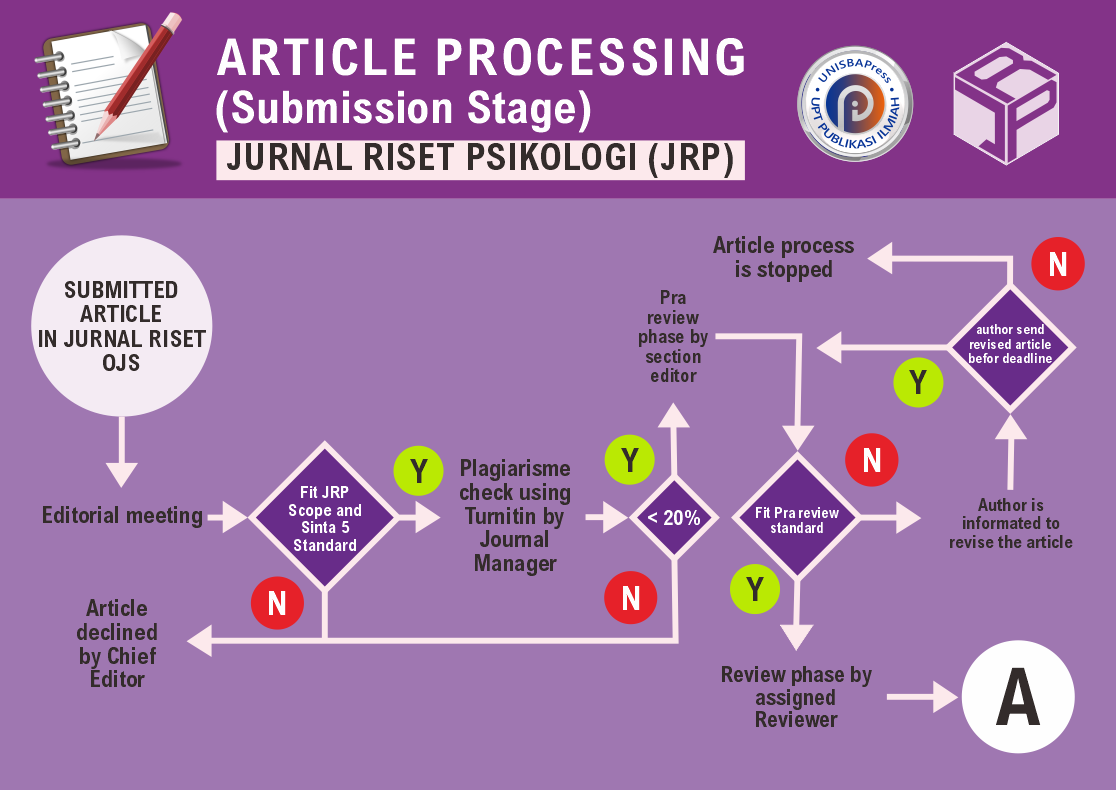Pengaruh Work Family Enrichment terhadap Work Engagement pada Ibu Bekerja yang Memiliki Anak Disabilitas
DOI:
https://doi.org/10.29313/jrp.v4i1.3875Keywords:
Work Family Enrichment, Working Mothers, Working Mothers Who Have Children With DisabilitiesAbstract
Abstract. Work engagement is a motivational construct, a positive state, and being fully involved in one's work which is characterized by vigor, dedication and absorption (Schaufeli et al., 2002). Work family enrichment is the extent to which an individual's experience in one role can improve the quality of life in another role (Greenhaus & Powell, 2006). The aim of this research is to determine the effect of Work Family Enrichment on Work Engagement in Working Mothers who Have Disabled Children which refers to the Work Family Enrichment theory from Greenhaus & Powell (2006) and the Work Engagement theory from Schaufeli & Bakker (2002). This research uses quantitative causality research methods with a sample of 101 working mothers who have children with disabilities. The data analysis technique uses multiple linear regression tests. To measure Work Engagement using the Utrecht Work Engagement Scale-9 (UWES-9) by Schaufelli & Bakker (2003). Meanwhile, to measure Work Family Enrichment, we use the measurement scale from Carlson et al., (2006). The research results show that the Work Family Enrichment value has an influence of 16.2% on Work Engagement. The direction of Family-Work Enrichment involvement has the greatest influence, namely 12.26%, on Work Engagement, with the affect dimension being the dimension that has the greatest influence, namely 7.94%.
Abstrak. Work engagement merupakan suatu konstruk motivasional, keadaan positif, dan secara penuh terlibat pada pekerjaannya yang ditandai dengan adanya vigor, dedication dan absorption (Schaufeli et al., 2002). Work family enrichment merupakan sejauh mana pengalaman individu pada suatu peran dapat meningkatkan kualitas hidup pada satu peran lainnya (Greenhaus & Powell, 2006). Tujuan dari penelitian ini untuk mengetahui pengaruh work family enrichment terhadap work engagement pada ibu bekerja yang memiliki anak disabilitas yang mengacu pada teori work family Enrichment dari Greenhaus & Powell (2006) dan teori work engagement dari Schaufeli & Bakker (2002). Penelitian ini menggunakan metode penelitian kuantitatif kausalitas dengan sampel sebanyak 101 orang ibu bekerja yang memiliki anak disabilitas. Teknik analisis data menggunakan uji regresi linear berganda. Untuk mengukur Work Engagement menggunakan Utrecht Work Engagement Scale-9 (UWES-9) oleh Schaufelli & Bakker (2003). Sedangkan untuk mengukur Work Family Enrichment menggunakan skala pengukuran dari Carlson et al., (2006). Hasil penelitian menunjukkan nilai work family enrichment memberikan pengaruh sebesar 16.2% terhadap work Engagement. Arah keterlibatan family-work enrichment memberikan pengaruh terbesar yaitu 12.26% terhadap work engagement dengan dimensi affect sebagai dimensi yang memberikan pengaruh terbesar yaitu 7.94%.
References
Sulis Mariyanti, Lita Patricia Lunanta, and Aisyah Ratnaningtyas, “MODEL WORK-LIFE BALANCE DALAM PENINGKATAN EMPLOYEE ENGAGEMENT PADA PEREMPUAN BEKERJA YANG MENJALANI PERAN GANDA,” Psychopedia Jurnal Psikologi Universitas Buana Perjuangan Karawang, vol. 7, no. 2, pp. 76–90, Dec. 2022, doi: 10.36805/psychopedia.v7i2.3428.
Kementrian Pemberdayaan Perempuan dan Perlindungan Anak and Badan Pusat Statistik, “PROFIL PEREMPUAN INDONESIA 2017,” kemenpppa, 2018.
Kementrian Pemberdayaan Perempuan dan Perlindungan Anak and Badan Pusat Statistik, “PROFIL PEREMPUAN INDONESIA 2018,” kemenpppa, 2019.
C. M. I. S. R. Kuntari, “Hubungan antara work-family enrichment dengan work engagement pada perawat wanita,” Jurnal Psikologi Ulayat, vol. 2, no. 1, pp. 407–417, Jun. 2020, doi: 10.24854/jpu32.
T. J. Opie and C. M. Henn, “Work-family conflict and work engagement among mothers: Conscientiousness and neuroticism as moderators,” SA Journal of Industrial Psychology, vol. 39, no. 1, Jan. 2013, doi: 10.4102/sajip.v39i1.1082.
J. H. Greenhaus and G. N. Powell, “When Work And Family Are Allies: A Theory Of Work-Family Enrichment,” Academy of Management Review, vol. 31, no. 1, pp. 72–92, Jan. 2006, doi: 10.5465/amr.2006.19379625.
P. Brandon, “Time away from ‘smelling the roses’: Where do mothers raising children with disabilities find the time to work?,” Soc Sci Med, vol. 65, no. 4, pp. 667–679, Aug. 2007, doi: 10.1016/j.socscimed.2007.04.007.
P. Hastuti, “Hubungan antara konflik peran ganda wanita karier dengan sikap kerja negatif,” Universitas Muhammadiyah Surakarta, Surakarta, 2008.
M. Koyuncu, R. J. Burke, and L. Fiksenbaum, “Work engagement among women managers and professionals in a Turkish bank,” Equal Opportunities International, vol. 25, no. 4, pp. 299–310, Jun. 2006, doi: 10.1108/02610150610706276.
Nida Ghaniyyaturrahmah, “Pengaruh Perceived Organizational Support terhadap Work Engagement pada Perawat RSUD Majalengka,” Jurnal Riset Psikologi, pp. 93–100, Dec. 2023, doi: 10.29313/jrp.v3i2.2752.
W. B. Schaufeli, M. Salanova, V. González-romá, and A. B. Bakker, “The Measurement of Engagement and Burnout: A Two Sample Confirmatory Factor Analytic Approach.,” J Happiness Stud, vol. 3, no. 1, pp. 71–92, 2002, doi: 10.1023/A:1015630930326.
A. B. Bakker and E. Demerouti, “Towards a model of work engagement,” Career Development International, vol. 13, no. 3, pp. 209–223, May 2008, doi: 10.1108/13620430810870476.
S. N. Hidayah and Palupiningdyah, “Testing of Work-Family Enrichment through Work Engagement,” Management Analysis Journal, vol. 8, no. 2, pp. 242–252, 2019.
D. F. Z. Susilo and S. A. Prahara, “Work-Family Enrichment dan Work Engagement pada Karyawan yang Sudah Menikah,” Mediapsi, vol. 5, no. 2, pp. 108–116, Dec. 2019, doi: 10.21776/ub.mps.2019.005.02.5.
Ranti Nurbayanti and D. Dwarawati, “Pengaruh Work Engagement terhadap Work-Family Enrichment pada Perawat Gigi,” Bandung Conference Series: Psychology Science, vol. 3, no. 1, Jan. 2023, doi: 10.29313/bcsps.v3i1.5384.
I. F. Kristiana, F. Fajrianthi, and U. Purwono, “ANALISIS RASCH DALAM UTRECHT WORK ENGAGEMENT SCALE-9 (UWES-9) VERSI BAHASA INDONESIA,” Jurnal Psikologi, vol. 17, no. 2, p. 204, Jan. 2019, doi: 10.14710/jp.17.2.204-217.
S. A. R. Denty and E. S. Indrawati, “HUBUNGAN ANTARA KEPUASAN PERNIKAHAN DENGAN WORK FAMILY ENRICHMENT PADA KARYAWAN PEREMPUAN DI PT. RIDHO AGUNG MITRA ABADI,” Jurnal EMPATI, vol. 10, no. 5, pp. 346–353, Jan. 2022, doi: 10.14710/empati.2021.32937.
D. Anggraini, A. Juniarly, and M. Pratiwi, “HARGA DIRI DAN OPTIMISME TERHADAP WORK FAMILY ENRICHMENT PADA TENAGA KESEHATAN WANITA,” Insight: Jurnal Ilmiah Psikologi, vol. 23, no. 2, Aug. 2021, doi: 10.26486/psikologi.v23i2.1454.
A. M. Marques, M. J. Chambel, and I. Pinto, “The Exchange Relationship between Work-Family Enrichment and Affective Commitment: the Moderating Role of Gender,” Span J Psychol, vol. 18, p. E35, Jun. 2015, doi: 10.1017/sjp.2015.38.
A. B. Bakker and M. P. Leiter, Work Engagement, 1st Edii. London: Psychology Press, 2010. doi: 10.4324/9780203853047.
W. B. Schaufeli, A. B. Bakker, and M. Salanova, “Utrecht work engagement scale-9.,” Educ Psychol Meas, 2003.
E. O. Christian and E. A. Pratiwi, “Work Family Enrichment terhadap Work Engagement,” PROCEEDING SERIES OF PSYCHOLOGY, vol. 1, no. 1, pp. 45–53, 2023.
E. Marais, M. De Klerk, J. A. Nel, and L. De Beer, “The antecedents and outcomes of work-family enrichment amongst female workers,” SA Journal of Industrial Psychology, vol. 40, no. 1, Feb. 2014, doi: 10.4102/sajip.v40i1.1186.
W. B. Schaufeli and A. B. Bakker, Defining and Measuring Work Engagement: Bringing Clarity to the Concept. 2010.













